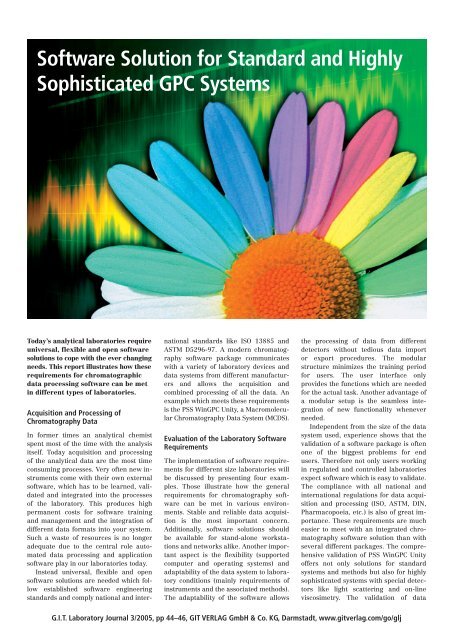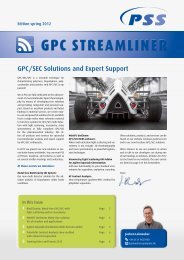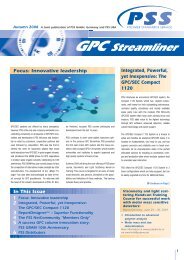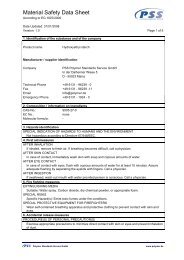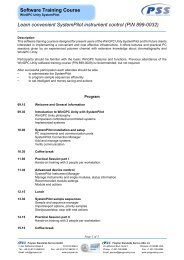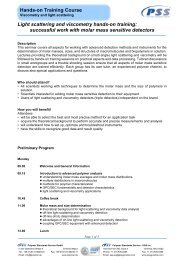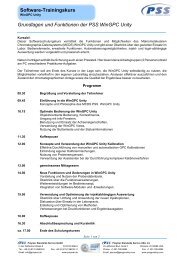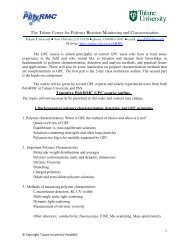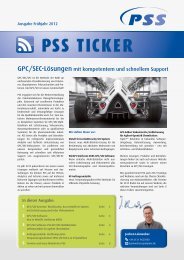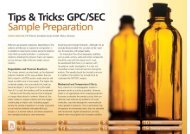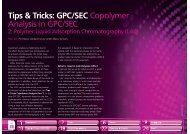Software Solution for Standard and Highly Sophisticated GPC ... - PSS
Software Solution for Standard and Highly Sophisticated GPC ... - PSS
Software Solution for Standard and Highly Sophisticated GPC ... - PSS
Create successful ePaper yourself
Turn your PDF publications into a flip-book with our unique Google optimized e-Paper software.
<strong>Software</strong> <strong>Solution</strong> <strong>for</strong> <strong>St<strong>and</strong>ard</strong> <strong>and</strong> <strong>Highly</strong><br />
<strong>Sophisticated</strong> <strong>GPC</strong> Systems<br />
Today’s analytical laboratories require<br />
universal, flexible <strong>and</strong> open software<br />
solutions to cope with the ever changing<br />
needs. This report illustrates how these<br />
requirements <strong>for</strong> chromatographic<br />
data processing software can be met<br />
in different types of laboratories.<br />
Acquisition <strong>and</strong> Processing of<br />
Chromatography Data<br />
In <strong>for</strong>mer times an analytical chemist<br />
spent most of the time with the analysis<br />
itself. Today acquisition <strong>and</strong> processing<br />
of the analytical data are the most time<br />
consuming processes. Very often new instruments<br />
come with their own external<br />
software, which has to be learned, validated<br />
<strong>and</strong> integrated into the processes<br />
of the laboratory. This produces high<br />
permanent costs <strong>for</strong> software training<br />
<strong>and</strong> management <strong>and</strong> the integration of<br />
different data <strong>for</strong>mats into your system.<br />
Such a waste of resources is no longer<br />
adequate due to the central role automated<br />
data processing <strong>and</strong> application<br />
software play in our laboratories today.<br />
Instead universal, flexible <strong>and</strong> open<br />
software solutions are needed which follow<br />
established software engineering<br />
st<strong>and</strong>ards <strong>and</strong> comply national <strong>and</strong> inter-<br />
national st<strong>and</strong>ards like ISO 13885 <strong>and</strong><br />
ASTM D5296-97. A modern chromatography<br />
software package communicates<br />
with a variety of laboratory devices <strong>and</strong><br />
data systems from different manufacturers<br />
<strong>and</strong> allows the acquisition <strong>and</strong><br />
combined processing of all the data. An<br />
example which meets these requirements<br />
is the <strong>PSS</strong> Win<strong>GPC</strong> Unity, a Macromolecular<br />
Chromatography Data System (MCDS).<br />
Evaluation of the Laboratory <strong>Software</strong><br />
Requirements<br />
The implementation of software requirements<br />
<strong>for</strong> different size laboratories will<br />
be discussed by presenting four examples.<br />
Those illustrate how the general<br />
requirements <strong>for</strong> chromatography software<br />
can be met in various environments.<br />
Stable <strong>and</strong> reliable data acquisition<br />
is the most important concern.<br />
Additionally, software solutions should<br />
be available <strong>for</strong> st<strong>and</strong>-alone workstations<br />
<strong>and</strong> networks alike. Another important<br />
aspect is the flexibility (supported<br />
computer <strong>and</strong> operating systems) <strong>and</strong><br />
adaptability of the data system to laboratory<br />
conditions (mainly requirements of<br />
instruments <strong>and</strong> the associated methods).<br />
The adaptability of the software allows<br />
the processing of data from different<br />
detectors without tedious data import<br />
or export procedures. The modular<br />
structure minimizes the training period<br />
<strong>for</strong> users. The user interface only<br />
provides the functions which are needed<br />
<strong>for</strong> the actual task. Another advantage of<br />
a modular setup is the seamless integration<br />
of new functionality whenever<br />
needed.<br />
Independent from the size of the data<br />
system used, experience shows that the<br />
validation of a software package is often<br />
one of the biggest problems <strong>for</strong> end<br />
users. There<strong>for</strong>e not only users working<br />
in regulated <strong>and</strong> controlled laboratories<br />
expect software which is easy to validate.<br />
The compliance with all national <strong>and</strong><br />
international regulations <strong>for</strong> data acquisition<br />
<strong>and</strong> processing (ISO, ASTM, DIN,<br />
Pharmacopoeia, etc.) is also of great importance.<br />
These requirements are much<br />
easier to meet with an integrated chromatography<br />
software solution than with<br />
several different packages. The comprehensive<br />
validation of <strong>PSS</strong> Win<strong>GPC</strong> Unity<br />
offers not only solutions <strong>for</strong> st<strong>and</strong>ard<br />
systems <strong>and</strong> methods but also <strong>for</strong> highly<br />
sophisticated systems with special detectors<br />
like light scattering <strong>and</strong> on-line<br />
viscosimetry. The validation of data<br />
G.I.T. Laboratory Journal 3/2005, pp 44–46, GIT VERLAG GmbH & Co. KG, Darmstadt, www.gitverlag.com/go/glj
systems can be easily checked on-site<br />
any time in any laboratory using<br />
Win<strong>GPC</strong>'s AutoVal tool.<br />
Case Studies<br />
Four live case scenarios from everyday<br />
identify decision-making scenarios faced<br />
by scientists <strong>and</strong> companies. In each<br />
case, the specific needs will be satisfied<br />
with the same MCDS, but in a different<br />
configuration.<br />
Case 1: Client/Server <strong>GPC</strong> <strong>Solution</strong> <strong>for</strong><br />
Distributed Work Processes<br />
A manufacturer of pharmaceutical products<br />
needs fully validated <strong>GPC</strong> software<br />
in different working areas, using the<br />
existing infrastructure. The software<br />
must be compatible with methods at<br />
other sites. <strong>GPC</strong> measurements have to<br />
be carried out <strong>and</strong> controlled from<br />
various departments. The analytical staff<br />
from different labs <strong>and</strong> offices, corporate-wide,<br />
must have on-line access to<br />
the data initially processed at the<br />
measurement site. The comprehensive<br />
analysis of the measurement is done in<br />
specialist departments; this should be<br />
possible even without having the equipment<br />
to execute <strong>GPC</strong> measurements on<br />
their own (Fig. 1).<br />
Selection Criteria<br />
The customer needs a software which<br />
� Is compliant with all national <strong>and</strong><br />
international <strong>GPC</strong> st<strong>and</strong>ards (e.g. ISO,<br />
EN, ASTM, DIN, JS), making it easier <strong>and</strong><br />
faster to put the products on the market<br />
� Offers comprehensive software validation<br />
easy to verify in audits<br />
� Has a central database with straight<strong>for</strong>ward<br />
data management <strong>and</strong> search<br />
routines<br />
� Integrates all <strong>GPC</strong> data in the existing<br />
worldwide LIMS system<br />
� Offers high level data security <strong>and</strong><br />
central access control using existing<br />
authentication mechanisms (e.g. a<br />
domain server)<br />
� Guarantees accessibility <strong>and</strong> support<br />
world wide<br />
� H<strong>and</strong>les all current <strong>and</strong> future tasks,<br />
minimizing training <strong>and</strong> support costs<br />
� Allows a comprehensive <strong>and</strong> fast data<br />
exchange between labs in different<br />
countries<br />
� Offers in client/server mode businesswide<br />
control over analytical jobs, no<br />
matter where they have to be done<br />
(“data follow people” technology)<br />
� Permits data acquisition via LAN,<br />
allowing a flexible, friendly use of the<br />
existing infrastructure<br />
� Facilitates the creation <strong>and</strong> publication<br />
of results <strong>and</strong> reports in the intranet,<br />
or via e-mail<br />
<strong>Solution</strong><br />
After a comprehensive test phase, the<br />
company chooses the <strong>PSS</strong> Win<strong>GPC</strong> Unity<br />
Client/Server <strong>GPC</strong> solution <strong>for</strong> distributed<br />
working<br />
Case 2: Easy <strong>and</strong> Flexible <strong>Software</strong><br />
<strong>Solution</strong> <strong>for</strong> St<strong>and</strong>-alone Systems<br />
A research lab needs a <strong>GPC</strong> system to<br />
build up a new working direction. The<br />
conceptual <strong>for</strong>mulation dem<strong>and</strong>s further<br />
processing of the primary <strong>GPC</strong> data with in<br />
house software. An older HPLC instrument<br />
<strong>and</strong> a computer with MS Win 95 need to<br />
be integrated in the new setup (Fig. 2).
Selection criteria<br />
The software has to meet following<br />
requirements:<br />
� It allows the integration of the HPLC<br />
instrument <strong>and</strong> further use of the old<br />
personal computer<br />
� The data export function facilitates<br />
further processing of <strong>GPC</strong> data<br />
� The easy to learn user interface minimizes<br />
learning curve time requirement<br />
� It provides straight<strong>for</strong>ward integration<br />
of results into research reports<br />
<strong>Solution</strong><br />
One Simple Win<strong>GPC</strong> Unity setup <strong>for</strong> a<br />
single instrument system<br />
Case 3: Modular Multi Instrument<br />
System in a Heterogeneous Laboratory<br />
Environment<br />
A central analytical laboratory that operates<br />
a (heterogeneous) chromatography<br />
infrastructure has to upgrade the equipment<br />
in order to meet customer requirements.<br />
The upgrade includes the<br />
purchase of new special detectors <strong>and</strong><br />
the development of new analytical <strong>and</strong><br />
data processing methods. Special<br />
requirement emphasis is placed on<br />
flexibility <strong>for</strong> all staff members to use the<br />
complete equipment (Fig. 3).<br />
Selection criteria<br />
The customer chooses the MCDS package<br />
because it<br />
� Is compatible with existing equipment<br />
� Integrates new instruments independent<br />
of the manufacturer<br />
� Supports not only evaluation of conventional<br />
<strong>GPC</strong> data, but also a lot of<br />
special methods/tasks <strong>and</strong> is modular<br />
� Meets the requirements of all national<br />
<strong>and</strong> international st<strong>and</strong>ards<br />
� Is fully validated <strong>and</strong> easily satisfies<br />
the needs of internal <strong>and</strong> external<br />
auditors<br />
� Uses the same user interface <strong>and</strong> data<br />
structure <strong>for</strong> all possible tasks<br />
� Has a safe <strong>and</strong> consistent database<br />
structure, guaranteeing maximum<br />
data security<br />
� Allows a flexible distribution <strong>and</strong><br />
assignment of the existing resources<br />
� Data evaluation licenses are free of<br />
charge<br />
� Creates task <strong>and</strong> customer specific<br />
result reports<br />
� Supports the results distribution by<br />
e-mail, fax <strong>and</strong> internet<br />
<strong>Solution</strong><br />
<strong>PSS</strong> Win<strong>GPC</strong> Unity with network support<br />
(Multi system/multi instrument setup) <strong>for</strong><br />
data acquisition <strong>and</strong> processing department-wide<br />
Case 4: Robust <strong>and</strong> Easy to Use Quality<br />
Control System<br />
A production lab needs a complete <strong>GPC</strong><br />
system <strong>for</strong> quality control to meet the dem<strong>and</strong>ing<br />
requirements of the customers<br />
(Fig. 4).<br />
Selection Criteria<br />
The software requirements are:<br />
� Data acquisition <strong>and</strong> processing can be<br />
fully automated<br />
� High availability <strong>and</strong> stability<br />
� Customer specific result reports<br />
� The possibility to automate the acceptance<br />
criteria of products with specific,<br />
targeted reports<br />
� The measurement results can easily be<br />
merged into the existing LIMS<br />
In addition, there are many advantages<br />
to buy the complete solution from<br />
the same company which<br />
� Has broad experience in quality<br />
control<br />
� Develops customer specific analytical<br />
methods <strong>and</strong> applications<br />
� Offers complete solutions with modern<br />
analytical hard- <strong>and</strong> software,<br />
columns, polymer st<strong>and</strong>ards <strong>and</strong> training<br />
courses<br />
� Sells only certified products which are<br />
developed, produced, distributed <strong>and</strong><br />
supported under ISO 9001<br />
<strong>Solution</strong><br />
<strong>PSS</strong> Columns, <strong>St<strong>and</strong>ard</strong>s <strong>and</strong> Win<strong>GPC</strong><br />
Unity <strong>for</strong> robust <strong>and</strong> easy to use <strong>GPC</strong> systems<br />
<strong>for</strong> quality control<br />
Conclusion<br />
From the decision-making presentation<br />
above it is possible to generalize some of<br />
the features that are important to users<br />
in the marketplace, such as stability <strong>and</strong><br />
reliability <strong>for</strong> data acquisition, flexibility<br />
to support various computer <strong>and</strong> operating<br />
systems as well as adaptability of the<br />
data system to the laboratory conditions<br />
<strong>and</strong> ease of implementation <strong>and</strong> integration<br />
into the lab.<br />
All users have their own specific needs<br />
<strong>and</strong> dem<strong>and</strong>s, easy to validate, whether<br />
or not they work in regulated laboratories.<br />
Independent from the size of the<br />
data system used, experience shows that<br />
the validation of a software package is often<br />
one of the biggest problems <strong>for</strong> the<br />
end user. The comprehensive validation<br />
of Win<strong>GPC</strong> Unity offers not only solutions<br />
<strong>for</strong> st<strong>and</strong>ard systems <strong>and</strong> methods but<br />
also <strong>for</strong> highly sophisticated systems with<br />
special detectors.<br />
The compliance with all national <strong>and</strong><br />
international regulations <strong>for</strong> data acquisition<br />
<strong>and</strong> processing (ISO, ASTM, DIN,<br />
Pharmacopoeias etc.) is also of great<br />
importance. With an integrated chromatography<br />
software solution, these requirements<br />
are much easier to meet than<br />
with several different packages.<br />
No longer will an analytical chemist<br />
have to spend most of the time learning<br />
multiple software products, or validating<br />
<strong>and</strong> integrating multiple processes <strong>and</strong><br />
data <strong>for</strong>mats into the data flow. Using<br />
Win<strong>GPC</strong> Unity will result in lower overhead<br />
costs <strong>and</strong> a better use of your human<br />
resources.<br />
Peter Kilz<br />
Dr. Martina Adler<br />
<strong>PSS</strong> Polymer <strong>St<strong>and</strong>ard</strong>s Service GmbH<br />
In der Dalheimer Wiese 5<br />
55120 Mainz, Germany<br />
Fax: +49 6131 96239 11<br />
pkilz@polymer.de<br />
www.polymer.de


